Samples may be added to user-defined
Picklists that facilitate operations on groups of samples such as adding or removing from a freezer, adding to a workflow job, or performing bulk operations. You can add samples to picklists from many places in the application, and create new ones as needed on the fly.
Team Picklists can be shared with others.
Administrators and users with the
Workflow Editor role can create and edit picklists.
A user can build a picklist privately, adding and removing samples until the correct set are defined. Samples of different types can be included on the same picklist. The completed list may be kept private or shared with other team members for use when performing other tasks.
Note that picklists are intended as a temporary grouping to support actions like including in a more persistent workflow job or freezer storage. Addition to picklists is not tracked as a timeline action for a sample.
Create a New Picklist from Samples
Select the desired samples on a grid and select
Picklists > Create a New Picklist. On narrower browsers, this option will be under the
More > menu:
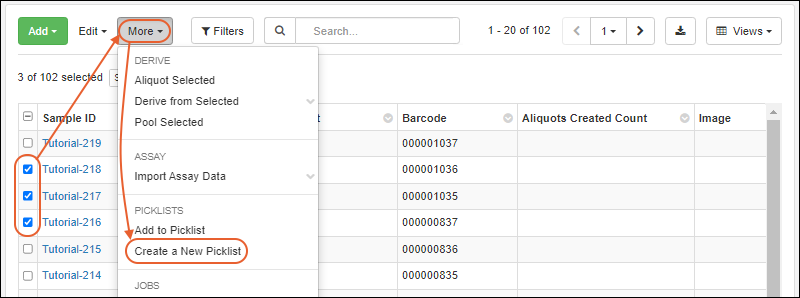
Give the picklist a name, optional description, check the box if you want to
share it with team members, then click
Create Picklist. The selected samples will be added to the new picklist.
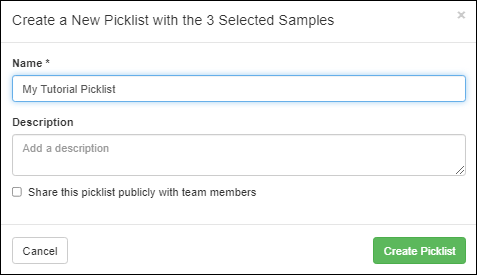
You will return to the sample grid, with a banner available offering a quick link to
View picklist.

Create Empty Picklist
You can also create an empty picklist (or team picklist) and add samples later. Click
Picklists on the main menu, then click
Create Picklist. Give it a name, optional description, and check the box if you wish to share it with your team.

Add Samples to Picklist
When you select samples in a grid and choose
Picklists > Add to Picklist (or
More > Add to Picklist), you will see all the Picklists available. If no picklists exist yet, you will be able to click
create a new one here.
When the number of picklists is long, you can narrow the list by typing in the "Find a picklist" box. Team picklists are shown on a separate tab, with team picklists you created yourself shown on the "My Picklists" tab with a
icon.
Click to select the desired picklist. You'll see the existing number of samples already on the list.
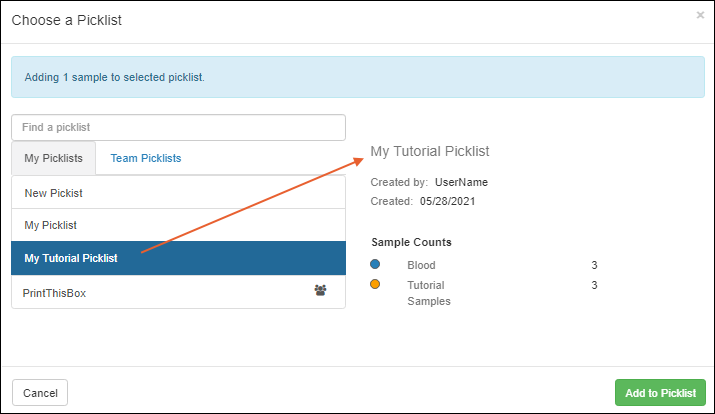
Click
Add to Picklist to add your selected samples to it.
Manage Picklists
Click
Picklists on the main menu.
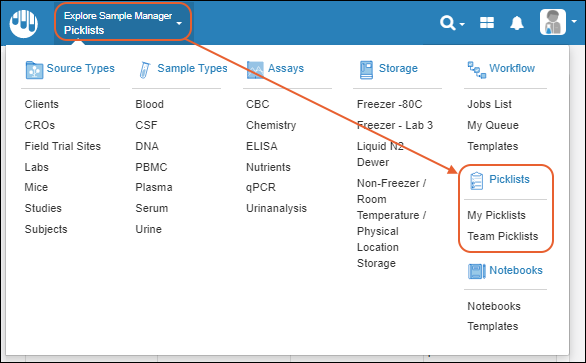

- Click Create Picklist to create a new empty one.
- The primary My Picklists tab shows the picklists you have created. The Sharing column indicates whether you've shared them with your team ("public") or kept them private.
- Click Team Picklists to see shared ones created by you or other team members.
- Click the Name of a picklist to open it for review or editing. Learn more about using picklists below.
To delete a picklist, select it here and click
Delete.
Note that if a sample is deleted from the system, it will be also be removed from any picklists.
View a Picklist
From the Picklists dashboard, click the name of a picklist to open it in grid form. You will see the samples on the list, available on a series of tabs. Each sample type present in the list can be seen on an individual named tab (DNA and Tutorial Samples below), with detailed properties for that sample type. The
All Samples tab shows the built in common properties, including the Sample ID, Status, and Storage information.
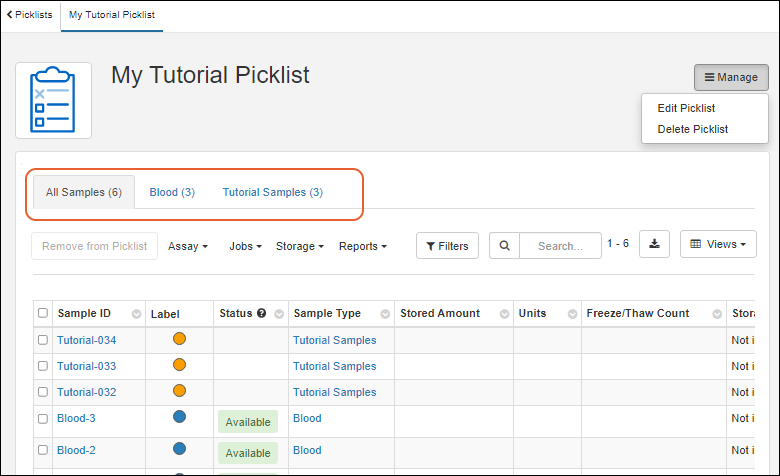
In the next section, learn about the various menus of actions available.
Refine and Use a Picklist
Actions available for picklists include:
- Manage
- Edit Picklist: Change the name, description, and whether the list is shared with your team.
- Delete Picklist: This removes the picklist, but does not delete any sample data.
Select one or more samples to:
On the tabs for individual sample types, you'll see the type-specific fields, and have more options for editing and deriving new samples. Learn more in this topic:
Export Picklists
To export a picklist, such as to use as a guide for physically removing samples from the freezer, click the
icon above the list of samples in the picklist. If any sample rows are selected, only selected rows will be exported. If no rows (or all rows) are selected, the entire picklist will be exported.
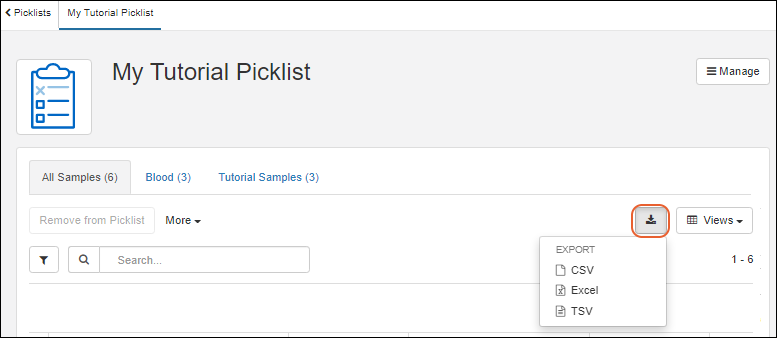
Export formats include:
- CSV
- Excel: For multi-tabbed picklists, you can select which tabs to include in your Excel export.
- TSV
Note that if you are using Sample Manager within a Premium Edition of LabKey Server, you can export most Sample Manager resources as part of a folder export, but picklists are not included in these folder archive exports.
Team Picklists and Permissions
When the
Share this picklist with team members box is checked for a picklist, it will appear for all team members on the
Team Picklists tab of the Picklist dashboard.
- Only the creator of a picklist may edit the name, description, and whether the list is shared with the team.
- All users with the Reader role in Sample Manager can read a team picklist and export the data for completing tasks.
- Any user with Editor or Admin permissions may also add or remove samples from team picklists and add picklists to jobs.
- Storage Editors can use picklists for adding and managing freezer storage of samples.
Related Topics